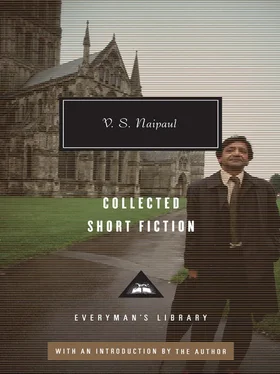Titus Hoyt was the first man I met when I came to Port of Spain, a year or two before the war.
My mother had fetched me from Chaguanas after my father died. We travelled up by train and took a bus to Miguel Street. It was the first time I had travelled in a city bus.
I said to my mother, ‘Ma, look, they forget to ring the bell here.’
My mother said, ‘If you ring the bell you damn well going to get off and walk home by yourself, you hear.’
And then a little later I said, ‘Ma, look, the sea.’
People in the bus began to laugh.
My mother was really furious.
Early next morning my mother said, ‘Look now, I giving you four cents. Go to the shop on the corner of this road, Miguel Street, and buy two hops bread for a cent apiece, and buy a penny butter. And come back quick.’
I found the shop and I bought the bread and the butter — the red, salty type of butter.
Then I couldn’t find my way back.
I found about six Miguel Streets, but none seemed to have my house. After a long time walking up and down I began to cry. I sat down on the pavement and got my shoes wet in the gutter.
Some little white girls were playing in a yard behind me. I looked at them, still crying. A girl wearing a pink frock came out and said, ‘Why you crying?’
I said, ‘I lost.’
She put her hands on my shoulder and said, ‘Don’t cry. You know where you live?’
I pulled out a piece of paper from my shirt pocket and showed her. Then a man came up. He was wearing white shorts and a white shirt, and he looked funny.
The man said, ‘Why he crying?’ in a gruff, but interested way.
The girl told him.
The man said, ‘I will take him home.’
I asked the girl to come too.
The man said, ‘Yes, you better come to explain to his mother.’
The girl said, ‘All right, Mr Titus Hoyt.’
That was one of the first things about Titus Hoyt that I found interesting. The girl calling him ‘Mr Titus Hoyt’. Not Titus, or Mr Hoyt, but Mr Titus Hoyt. I later realized that everyone who knew him called him that.
When we got home the girl explained to my mother what had happened, and my mother was ashamed of me.
Then the girl left.
Mr Titus Hoyt looked at me and said, ‘He look like a intelligent little boy.’
My mother said in a sarcastic way, ‘Like his father.’
Titus Hoyt said, ‘Now, young man, if a herring and a half cost a penny and a half, what’s the cost of three herrings?’
Even in the country, in Chaguanas, we had heard about that.
Without waiting, I said, ‘Three pennies.’
Titus Hoyt regarded me with wonder.
He told my mother, ‘This boy bright like anything, ma’am. You must take care of him and send him to a good school and feed him good food so he could study well.’
My mother didn’t say anything.
When Titus Hoyt left, he said, ‘Cheerio!’
That was the second interesting thing about him.
My mother beat me for getting my shoes wet in the gutter but she said she wouldn’t beat me for getting lost.
For the rest of that day I ran about the yard saying, ‘Cheerio! Cheerio!’ to a tune of my own.
That evening Titus Hoyt came again.
My mother didn’t seem to mind.
To me Titus Hoyt said, ‘You can read?’
I said yes.
‘And write?’
I said yes.
‘Well, look,’ he said, ‘get some paper and a pencil and write what I tell you.’
I said, ‘Paper and pencil?’
He nodded.
I ran to the kitchen and said, ‘Ma, you got any paper and pencil?’
My mother said, ‘What you think I is? A shopkeeper?’
Titus Hoyt shouted, ‘Is for me, ma’am.’
My mother said, ‘Oh,’ in a disappointed way.
She said, ‘In the bottom drawer of the bureau you go find my purse. It have a pencil in it.’
And she gave me a copy-book from the kitchen shelf.
Mr Titus Hoyt said, ‘Now, young man, write. Write the address of this house in the top right-hand corner, and below that, the date.’ Then he asked, ‘You know who we writing this letter to, boy?’
I shook my head.
He said, ‘Ha, boy! Ha! We writing to the Guardian , boy.’
I said, ‘The Trinidad Guardian ? The paper? What, me writing to the Guardian ! But only big big man does write to the Guardian. ’
Titus Hoyt smiled. ‘That’s why you writing. It go surprise them.’
I said, ‘What I go write to them about?’
He said, ‘You go write it now. Write. To the Editor, Trinidad Guardian . Dear Sir, I am but a child of eight (How old you is? Well, it don’t matter anyway) and yesterday my mother sent me to make a purchase in the city. This, dear Mr Editor, was my first peregrination (p-e-r-e-g-r-i-n-a-t-i-o-n) in this metropolis, and I had the misfortune to wander from the path my mother had indicated—’
I said, ‘Oh God, Mr Titus Hoyt, where you learn all these big words and them? You sure you spelling them right?’
Titus Hoyt smiled. ‘I spend all afternoon making up this letter,’ he said.
I wrote: ‘… and in this state of despair I was rescued by a Mr Titus Hoyt, of Miguel Street. This only goes to show, dear Mr Editor, that human kindness is a quality not yet extinct in this world.’
The Guardian never printed the letter.
When I next saw Titus Hoyt he said, ‘Well, never mind. One day, boy, one day, I go make them sit up and take notice of every word I say. Just wait and see.’
And before he left he said, ‘Drinking your milk?’
He had persuaded my mother to give me half a pint of milk every day. Milk was good for the brains.
It is one of the sadnesses of my life that I never fulfilled Titus Hoyt’s hopes for my academic success.
I still remember with tenderness the interest he took in me. Sometimes his views clashed with my mother’s. There was the business of the cobwebs, for instance.
Boyee, with whom I had become friendly very quickly, was teaching me to ride. I had fallen and cut myself nastily on the shin.
My mother was attempting to cure this with sooty cobwebs soaked in rum.
Titus Hoyt was horrified. ‘You ain’t know what you doing,’ he shouted.
My mother said, ‘Mr Titus Hoyt, I will kindly ask you to mind your own business. The day you make a baby yourself I go listen to what you have to say.’
Titus Hoyt refused to be ridiculed. He said, ‘Take the boy to the doctor, man.’
I was watching them argue, not caring greatly either way.
In the end I went to the doctor.
Titus Hoyt reappeared in a new role.
He told my mother, ‘For the last two three months I been taking the first-aid course with the Red Cross. I go dress the boy foot for you.’
That really terrified me.
For about a month or so afterwards, people in Miguel Street could tell when it was nine o’clock in the morning. By my shrieks. Titus Hoyt loved his work.
All this gives some clue to the real nature of the man.
The next step followed naturally.
Titus Hoyt began to teach.
It began in a small way, after the fashion of all great enterprises.
He had decided to sit for the external arts degree of London University. He began to learn Latin, teaching himself, and as fast as he learned, he taught us.
He rounded up three or four of us and taught us in the verandah of his house. He kept chickens in his yard and the place stank.
That Latin stage didn’t last very long. We got as far as the fourth declension, and then Boyee and Errol and myself began asking questions. They were not the sort of questions Titus Hoyt liked.
Boyee said, ‘Mr Titus Hoyt, I think you making up all this, you know, making it up as you go on.’
Titus Hoyt said, ‘But I telling you, I not making it up. Look, here it is in black and white.’
Читать дальше









